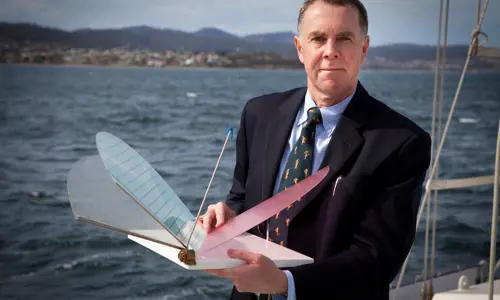Harnessing the waves of change: how a Sydney oceanographer found answers to climate change in the ocean

Scientists from every corner of the globe are working to combat climate change, and while a collective effort is crucial, occasionally, one person rises to the surface with such an original take on the problem that the world sits up and takes notice.
Sydney oceanographer Professor Trevor McDougall is that person. His groundbreaking work in understanding the critical role of the ocean in climate change has won him global acclaim, providing the scientific community with enhanced tools for measuring the ocean’s substantial influence on climate change.
 Prof. Trevor McDougall
Prof. Trevor McDougall
Since 2012, Professor McDougall has been a Scientia Professor of Ocean Physics at Sydney’s esteemed University of New South Wales (UNSW Sydney), named one of the world’s top 20 universities in the 2024 QS World University Rankings. His advancements in how scientists approach the study of the ocean’s role in climate dynamics have been pivotal, his work improving the accuracy of heat calculations in seawater by a factor of 100.
He was named NSW Scientist of the Year for his efforts in 2023 and won the $250,000 Prime Minister’s Prize for Science in 2022. He is also the current (2024) NSW Scientist of the Year in the Premier’s Prizes for Science & Engineering.
The ocean’s pivotal role in climate change and science
There was no talk of climate change when Professor McDougall began his career. He says, “No one knew about El Nino and La Nina.” It was when he was well into his career that climate change became a recognised issue. Suddenly, he found himself at the coalface of an issue that has become the most urgent challenge of our time.
Spending years immersed in the fundamentals of physics and chemistry, one of his crowning achievements was developing a mathematical technique that has radically changed how we measure and understand heat in the ocean. Through this and other innovative ideas, he has shown that the planet has warmed 14 per cent faster than previously thought – a discovery that has major implications for global climate policy and action.
“A very important question that arises is, ‘How much has the planet warmed since we’ve been burning fossil fuels and releasing CO2?’ And the answer to that lies in the ocean,” Professor McDougall says. “The ocean has absorbed over 90 per cent of the extra heat the planet has received from the greenhouse effect.”
Professor McDougall’s work focuses on ocean mixing and thermodynamics, which are essential for understanding heat transfer between the ocean and atmosphere. This research is vital, as the ocean acts as a significant heat reservoir, absorbing most of the planet’s excess heat due to greenhouse gas emissions. By refining our comprehension of how heat is stored in the ocean, Professor McDougall has directly influenced our ability to model climate change and predict future climatic shifts.
“What I’ve done is get back to basics and discover more accurate ways of understanding things like how much heat is contained in one kilogram of seawater. It seems like a very basic question, but we’ve been ignoring that until a few years ago. Now we’ve redefined what seawater is and what salinity is, and these things are now part of the global tool set.”
“The two really attractive things when I came here from Hobart 12 years ago were, first of all, the Centre of Excellence in Climate Studies at the University of New South Wales, with people like Professor Matthew England and Professor Andy Pitman. That’s the largest group of people doing non-observational work in the atmosphere and the ocean, for example modelling and theoretical work.
“Secondly, I work in the School of Mathematics and Statistics, and that was attractive because it’s the best mathematics school in Australia. So that’s been a really important home for me for the last 12 years, and the number of oceanographers there has grown to four or five. That’s been really pleasing to see – the importance of this subject being accepted by the mathematics department of the university.
“I think UNSW Sydney punches above its weight in this field, and it’s great to see because it complements the more observational work that the CSIRO and the Bureau of Meteorology do.
“In terms of the key players … we all know each other, and the competition is healthy. You’re always going to have centres overseas that are going to be bigger and specialise in things we don’t specialise in. But the game is a global game, and there are a thousand different things that need to be gotten right in a climate model context.
“Typically, in a year, I’d visit three or four centres of expertise, like Stockholm or Cambridge. I’ll give a talk and listen to what they’re doing. No one says, ‘I’m working in this area, but I can’t tell you about it’. That just doesn’t happen in this field as it does in other fields.
“Personally, I know where my niche is and what things I can be working on that will make a difference, and I can bet my bottom dollar that no one else will be thinking about that. I’ve got my own little area of expertise and it’s nice to know that once I come up with something that’s workable, it will be taken on board.”
Professor McDougall’s contributions are a testament to the pivotal role of science in addressing global challenges and the importance of fostering a deeply interconnected and collaborative research community, such as those he’s part of in Sydney.
Through his work, Professor McDougall has not only expanded the frontiers of oceanographic research but has also played a critical role in informing global climate policy. By accurately explaining the complex interactions between the ocean and climate, his research equips scientists and policymakers with the knowledge needed to develop viable solutions to climate change.
Hero image: credit Destination NSW



